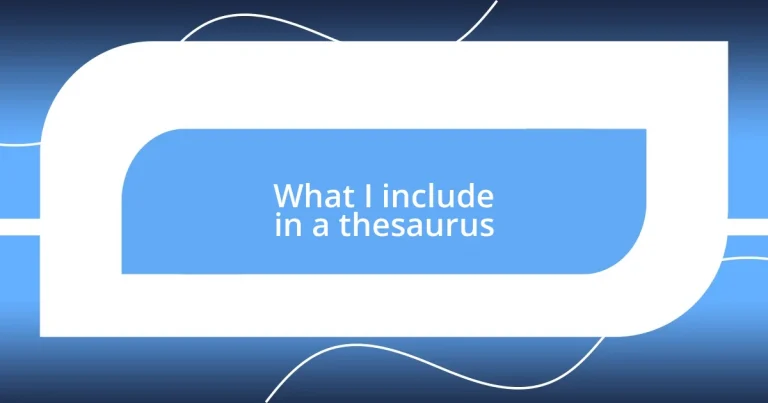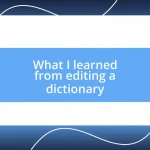Key takeaways:
- A thesaurus enhances writing by offering synonyms and antonyms, which deepen expression and evoke specific emotions.
- Key features of a thesaurus include organized entries, usage examples, and clear identification of parts of speech, making it a valuable writing tool.
- Effective use of a thesaurus involves checking synonyms in context, exploring word families for variations, and using it as a creative resource rather than just a replacement tool.
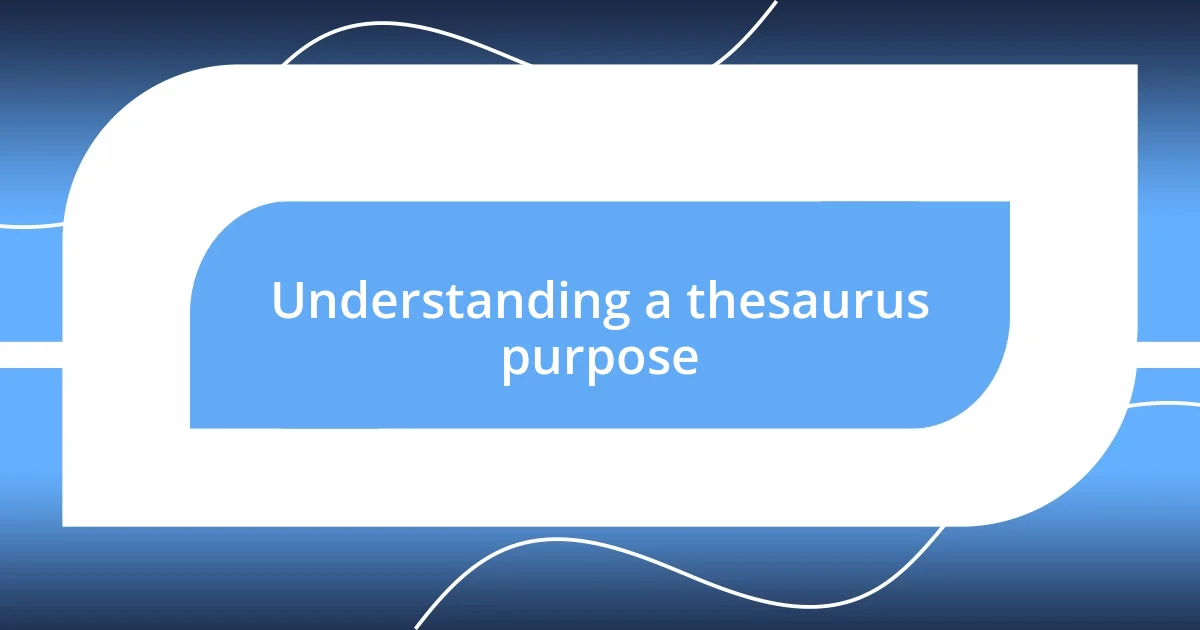
Understanding a thesaurus purpose
A thesaurus serves as a treasure trove for anyone looking to enrich their vocabulary and enhance their writing. I still remember the first time I discovered just how powerful it could be—flipping through its pages, I stumbled upon words I never knew existed. It was like finding hidden gems that could add a sparkle to my prose.
When I use a thesaurus, I often find myself asking, “How can I express this idea more vividly?” It’s not just about finding synonyms but also understanding the nuances between them. For instance, the difference between “happy,” “joyful,” and “elated” isn’t just semantic; it’s about capturing the precise emotion I want to convey.
Understanding a thesaurus’s purpose goes beyond mere vocabulary expansion—it’s about discovery and creativity. It invites you to play with language, which can be incredibly exhilarating. Each term carries its own connotation, providing a unique angle to your writing, and I’ve learned that the right word at the right moment can transform an ordinary sentence into something extraordinary.
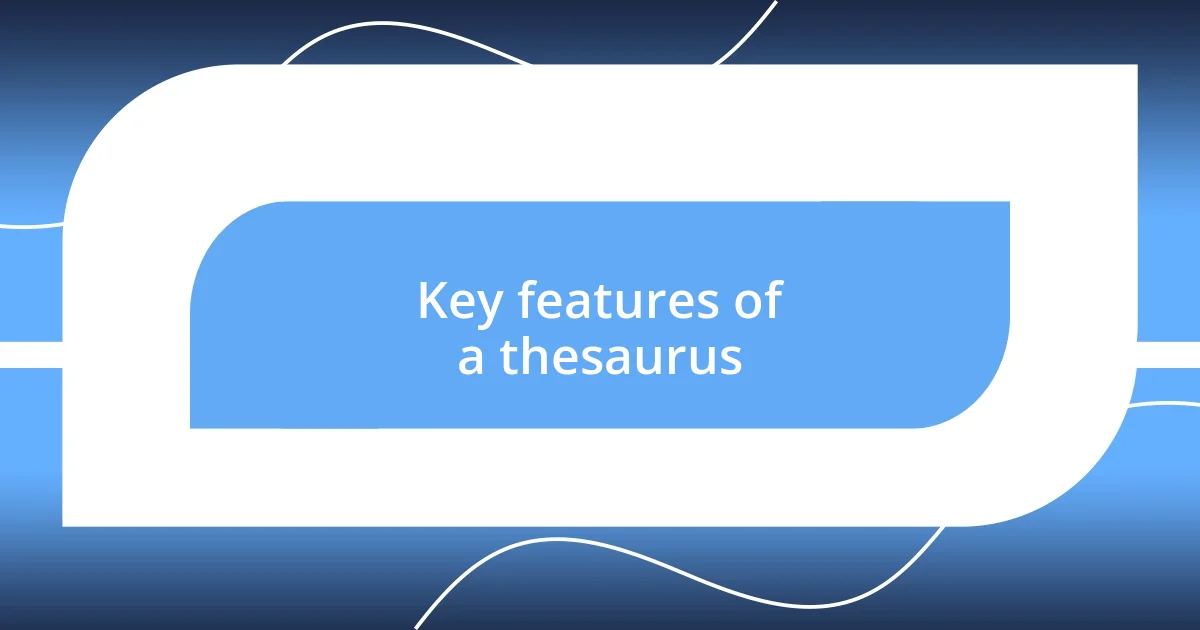
Key features of a thesaurus
When I think about the key features of a thesaurus, a few elements stand out to me as absolutely essential. One of the biggest advantages is the systematic organization of synonyms and antonyms, allowing users to easily explore word relationships. I remember once browsing through an old, dusty thesaurus that belonged to my grandmother; it wasn’t just a book of words, but a portal to different shades of meaning.
Here are some key features that you’ll often find in a thesaurus:
- Synonyms and Antonyms: A thesaurus lists words with similar and opposite meanings, giving a comprehensive view of language options.
- Word Relationships: Many thesauri demonstrate how words connect, highlighting not just synonyms but also nuanced differences in use.
- Usage Examples: I appreciate when a thesaurus provides sample sentences, as they help clarify how different synonyms can be applied in context.
- Part of Speech: Knowing whether a word is a noun, verb, or adjective helps me determine the right fit for my sentence.
- Etymology: Some thesauri include the origin of words, which can deepen my connection to them and enhance my understanding.
Having these features readily available transforms the writing process into an engaging exploration rather than a mundane task. I’m always excited to uncover new ways to express my thoughts, and a well-structured thesaurus is invaluable for that journey.
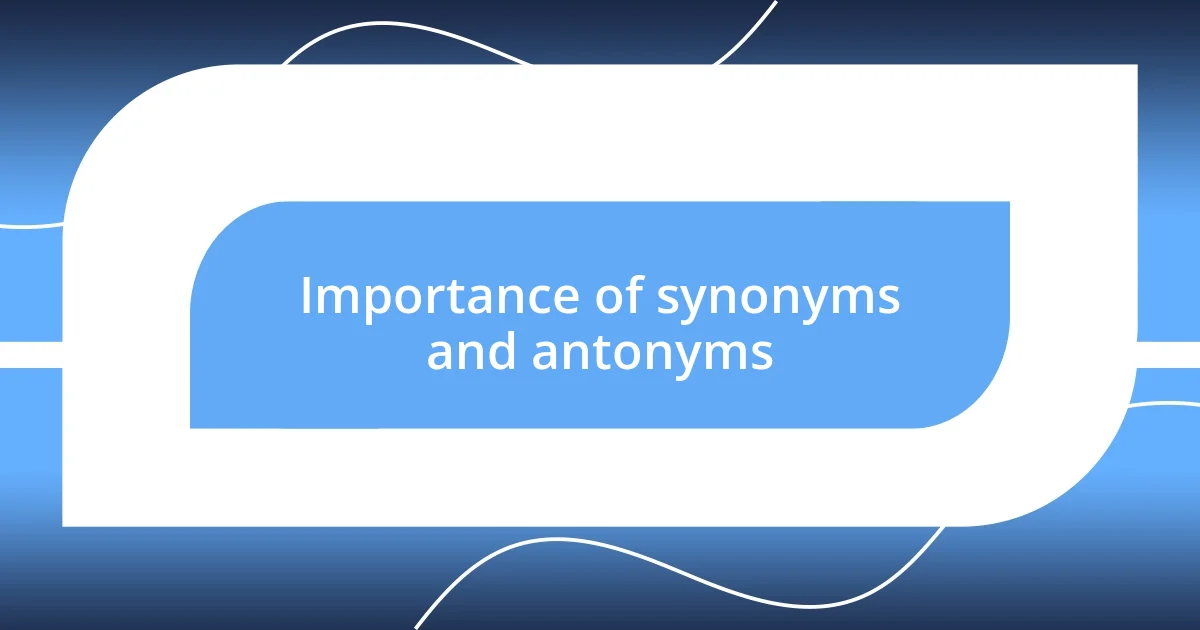
Importance of synonyms and antonyms
Understanding synonyms and antonyms is like unlocking a second level of communication. I’ve found that using synonyms can add flavor and diversity to my writing; it’s almost like being a chef, where each word is an ingredient that can alter the taste of a dish. On the flip side, antonyms serve a vital role as well. They provide contrast, allowing me to highlight differences and emphasize particular points. How powerful can a simple word choice be? A sentence can shift from dull to dynamic just by swapping one term for its opposite.
In my experience, the importance of these word relationships extends beyond mere vocabulary enhancement. When I think of a time I described a sunset, I realize the word “beautiful” works, but “breathtaking” elevates my expression to a different realm entirely. Playing with synonyms allows me to paint a more vivid picture, while antonyms help to reinforce my messages by creating a sharp distinction. Have you ever noticed how choosing the right word can evoke a specific emotion? That’s the magic of language—and synonyms and antonyms are key players in that realm.
Ultimately, the art of incorporating synonyms and antonyms opens up a world of possibility. It allows me to resonate with my readers on a deeper level, capturing their emotions and imagination. I remember reading a poem where the use of antonyms created a striking contrast, enhancing the overall impact of the piece. It reminded me that words are not just tools; they are instruments of connection.
| Synonyms | Antonyms |
|---|---|
| Happy | Sad |
| Brave | Cowardly |
| Bright | Dim |
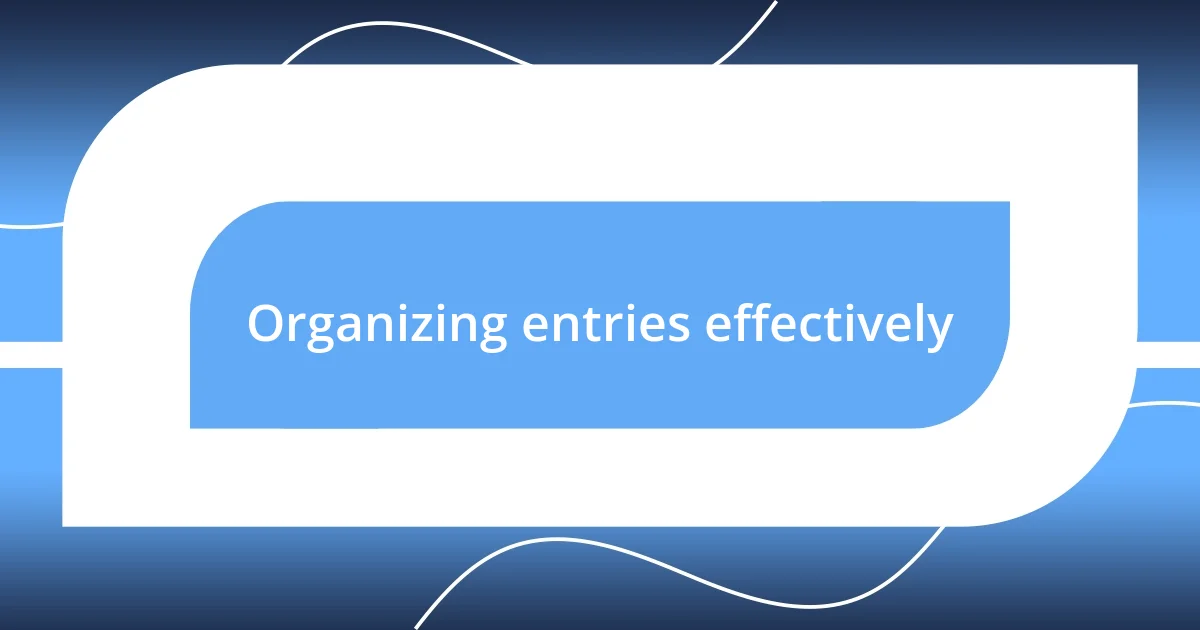
Organizing entries effectively
When organizing entries in a thesaurus, I’ve learned that categorizing words in a way that reflects their nuances and relationships makes a world of difference. For instance, I like to see words grouped not just by similar meanings but also by context. Remember the time I struggled to find just the right word while writing an article? If the entries had been organized by usage, I would have found a perfect match in no time!
I also believe that clarity is crucial. I once used a thesaurus that mixed together different parts of speech, which left me frustrated and confused. Can you imagine the impact on a writer trying to find the right verb, only to be bombarded with nouns and adjectives? By clearly labeling each entry with its part of speech, a thesaurus can truly become a trusted companion in the writing process.
Finally, I’m all for visual aids in organizing entries. When I encounter tables or charts that relate words visually, I tend to remember those connections better. It’s like having a colorful map of language at my fingertips. Have you ever noticed how a well-structured layout can transform your experience? I certainly have, and it’s made my writing not just easier, but far more enjoyable.
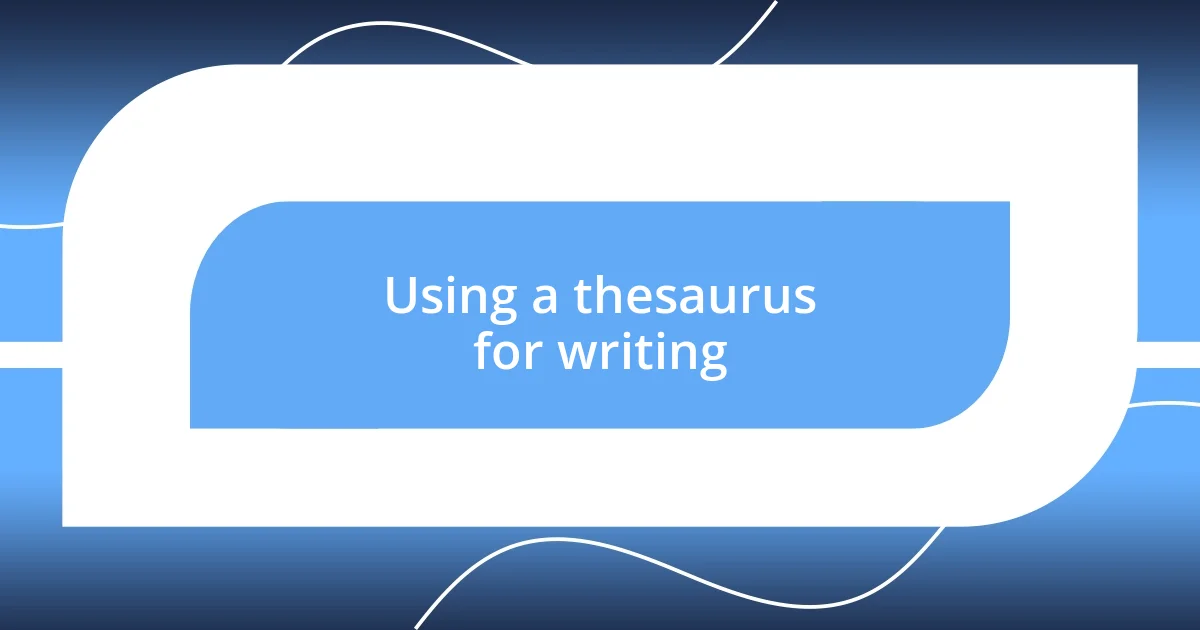
Using a thesaurus for writing
When I sit down to write, I often reach for my thesaurus as if it were a trusted friend. It’s amazing how a single word can open up new avenues of expression. For example, the other day, I was crafting a story and wanted to describe a character’s laughter. Instead of just saying “funny,” I found “hilarious” and even “uproarious.” Such shifts can elevate an otherwise ordinary description into something memorable. Have you ever felt the impact of a strong word choice in your own writing?
There are times, though, when using a thesaurus can feel overwhelming. I remember a project where I started substituting every other word just to sound more sophisticated, but then I lost my unique voice. It’s a delicate balance—enhancing clarity while maintaining authenticity. I’ve learned that sometimes the simplest word can have the most powerful effect. Ever stumbled upon a piece where the writer’s true voice shone through? That’s what keeps readers coming back.
Occasionally, I challenge myself to write without immediately consulting my thesaurus. I jot down my ideas freely and then sift through for ways to enhance my word choices later. This method allows me to retain the flow of my thoughts while still giving me the tools to polish my work afterward. It’s like creating a rough draft before sculpting it into a masterpiece—what’s your approach to using a thesaurus in your writing?
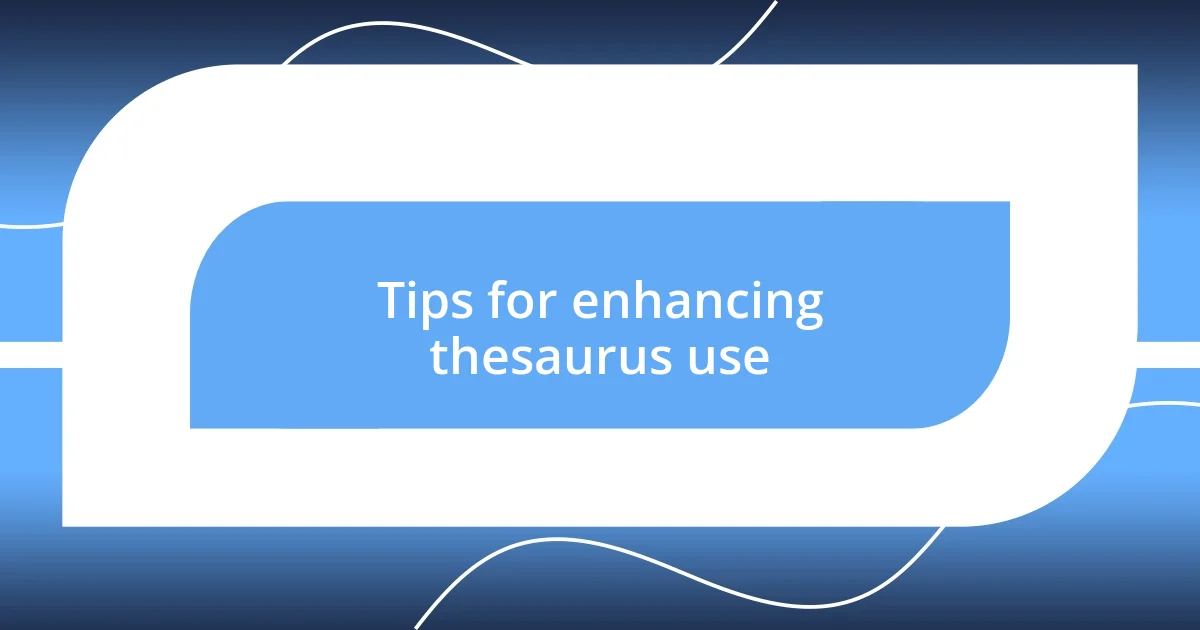
Tips for enhancing thesaurus use
When enhancing my thesaurus use, I’ve found it incredibly helpful to always double-check synonyms in context. One time, I was tempted to swap “happy” for “elated” in a sensitive piece, but it didn’t quite fit the tone I was aiming for. It’s a great reminder that while a thesaurus opens up new options, it’s essential to consider the emotional weight and nuance of each word.
I also encourage experimenting with word families. Whenever I come across a new term, I take a moment to explore its variations—like how “inform” expands to “informative” or “information.” This not only enriches my vocabulary but also lets me play with different angles in my writing. Have you ever discovered a related word that shifted your perspective on an idea? It can be surprising how interconnected language is!
Lastly, I’ve made it a habit to use my thesaurus as a tool for creativity, not just for finding replacements. Sometimes I’ll browse through entries just to see what catches my eye, letting myself drift through the sea of words. This practice has sparked ideas and themes I never would have considered otherwise. It’s like going on a treasure hunt for inspiration—how often do you allow yourself to be playful with language?











